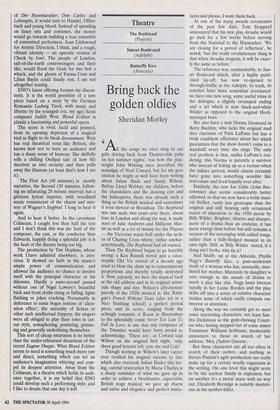Theatre
The Boyfriend (Players) Sunset Boulevard (Adelphi) Butterfly Kiss (Almeida)
Bring back the golden oldies
Sheridan Morley
Al the songs we once sang to our girls driving back from Thames-side pubs on hot summer nights', was how the play- wright John Whiting once described the nostalgia of Noel Coward, but for my gen- eration he might as well have been writing about Julian Slade and Sandy Wilson. Before Lloyd Webber, my children, before the chandeliers and the dancing cats and the helicopters, there was already such a thing as the British musical and sometimes it even thrived on Broadway. The Boyfriend was one such: two years over there, about four in London and along the way, it made stars of Julie Andrews and Millicent Mar- tin as well as a lot of money for the Players — the Victorian music-hall under the arch- es of Charing Cross where, rather unchar- acteristically, The Boyfriend had all started.
Then The Boyfriend began to go horribly wrong: a Ken Russell movie and a catas- trophic Old Vic revival of a decade ago tried to blow the show up to contemporary proportions and thereby totally destroyed it. Now, joyously, we have the musical back at the old address and in its original minis- cule shape and size. Wilson's affectionate parody of the 1920s musical is, like Ratti- gan's French Without Tears (also set in a Nice finishing school) a perfect period piece, and its score, ranging from the achingly romantic A Room in Bloomsbury to the splendidly comic Never Too Late To Fall In Love, is one that any composer of the Twenties would have been proud to acknowledge. 'There are', as Coward told Wilson on the original first night, 'only three good lyricists left: you, me and Cole'.
Though nothing in Wilson's later career ever rivalled his original success (a fate which also overtook Julian Slade) this lov- ing, careful restoration by Maria Charles is a sharp reminder of what we gave up in order to achieve a blockbuster, exportable British stage musical: we gave up charm and satire and elegance and perfect minia- tures and please, I want them back.
At one of the many awards ceremonies of the past few days, Tom Stoppard announced that his new play Arcadia would go dark for a few weeks before moving from the National to the Haymarket: 'We are closing for a period of reflection', he noted, 'but the really revolutionary thing is that when Arcadia reopens, it will be exact- ly the same as before.'
The reference was, unmistakably, to Sun- set Boulevard which, after a highly publi- cised lay-off, has now re-opened to through-traffic at the Adelphi. In truth, its rewrites have been somewhat overstated: we have one new song, some useful trims in the dialogue, a slightly revamped ending and a set which is now black-and-white Wilder as opposed to the original Hock- neyesque hues.
We also have a new Norma Desmond in Betty Buckley, who lacks the original mad diva charisma of Patti LuPone but has a brisk roadshow efficiency about her which guarantees that the show doesn't come to a standstill every time she sings. The only real problem is that, unlike LuPone's ren- dering, this Norma is patently a survivor who instead of holing up as a recluse when the talkies arrived, would almost certainly have gone into something sensible like real-estate and lived happily ever after.
Similarly, the new Joe Gillis (John Bar- rowman) also seems considerably better adjusted, so that we now have a brisk musi- cal thriller, vastly less grotesque than the original and still bearing only occasional traces of alteration to the 1950 movie by Billy Wilder. Brighter, shorter and sharper, more of a drama than an oratorio, it has more energy than before but still remains a version of the screenplay with added songs, rather than a fully-fledged musical in its own right. Still, as Billy Wilder noted, if a thing ain't broke, why fix it?
And finally, up at the Almeida, Phyllis Nagy's Butterfly Kiss, a post-modernist study of a woman who has, unusually, mur- dered her mother, Matricide by daughter is rare enough in the annals of drama to merit a play like this. Nagy loses interest rapidly in her Lizzie Borden and the play drifts off into a series of relative character studies none of which really compels our interest or attention.
Along the way we certainly get to meet some interesting characters, not least San- dra Dickinson as the gum-chewing Count- ess who, having stepped out of some minor Tennessee Williams hothouse, memorably announces to those in search of her address, `Moi, j'habite Queens'.
But these characters are all too often in search of their author, and nothing in Steven Pimlott's agile production can really make up for a certain woolly vagueness in the writing. On one level this might seem to be the nuclear family in explosion, but on another it's a moral maze with no way out. Elizabeth Berridge is suitably mysteri- ous as the mother-killer.


























































 Previous page
Previous page